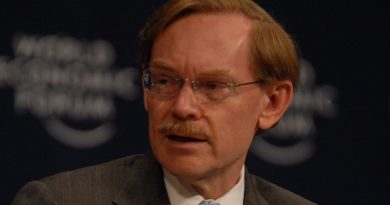Book Review: The Endless Quest for Israeli-Palestinian Peace by Robert Serry
By Gabrielle Hunt
Staff Writer
For Diplomacy students, the endless quest for peace between Israel and Palestine represents more than just an ongoing conflict. The decades-long quandary has been the foremost case study in our introductory international relations courses, and because the conflict continues to be a polarizing and seemingly unresolvable, students and diplomats alike have often grown weary of talking and reading about it.
Robert Serry, whose latest book is titled “The Endless Quest for Israeli-Palestinian Peace: A Reflection from No Man’s Land,” understands this exhaustion more than anyone. Serry, who served as the United Nations special coordinator for the Middle East Peace Process and the United Nations Secretary-General’s personal representative to the Palestine Liberation Organization and the Palestinian Authority from 2008 to 2015, reflects on seven years of constant brokering, unsustainable ceasefires, shuttle diplomacy, and the enormous pressure of his position. In addition to recounting his own frustrations with the conflict, he describes the times when he believed the conflict was overshadowed by the Arab Spring.
Serry, however, ends his seven-year narrative on an optimistic note: a message to all of us that we should continue to discuss the future of Israeli-Palestinian peace and believe that there is an end in sight, particularly because he has seen the disasters of inaction firsthand. Those looking for a backgrounder on the Israeli-Palestinian conflict should look elsewhere, as Serry’s precision and attention to detail will be dense even to those with a comfortable knowledge of the situation. However, for those interested in a perspective flavored by candor and the wisdom of hindsight that deeply analyzes and casts light on the nuances of negotiation, language, and what it means to be an agent of the U.N., Serry’s work will be compelling and enriching, as “Endless Quest” is a book only he could have written.
Though Serry lays out a plan for his talking points in the introduction, his preface is most helpful in drawing out the larger themes of his narrative. Serry’s preface illustrates the three themes he touches upon throughout “Endless Quest.”
First, Serry reveals how the deeply polarizing nature of the Israeli-Palestinian conflict extends to every area of diplomacy: decisions, appointments, and the very language of resolutions and agreements. In his account of initial negotiations at the beginning of his tenure, he recalls Foreign Minister Sergey Lavrov of Russia and former Secretary of State Condoleezza Rice disagreeing at the negotiation table, although both acknowledged that they would most likely agree outside the parameters of their respective foreign policies.
Serry is especially frustrated with how polarization obscures truth on the site of the conflict: the absence of independent, third-party monitoring often muddled the facts of small-scale violent incidents, making it difficult to hold either party accountable.
The second of Serry’s themes is the juxtaposition of opposites — particularly the dichotomies of history and modernity, and of external versus internal actors. For example, Serry discusses the issue of reconciling the addition of modernity (the U.N.) to the historical mores and leadership of the region — this presents a challenge to preserving the 1967 borders agreement in the 21st century and to blending entrenched religious thought with neutral mediators.
Serry reveals that he was always weighing the goals of international actors (e.g., the United Nations and the United States) against the interests of regional and state leaders. Multiple regime changes in Egypt complicated the peace process, and Serry’s narrative even humanizes characters like President Mohammed Morsi and the Muslim Brotherhood, who have been villainized by the international community.
The third theme Serry touches on in “Endless Quest” is the importance of relentless grit to finding solutions. In his seven years as special coordinator, Serry faced broken ceasefires and unsustainable plans, risked his reputation for controversial meetings (including directly contacting Hamas), and even became entangled in unfounded accusations of money laundering. He concludes his memoir with a strong case for the two-state solution, despite being undermined by years of unsuccessful attempts.
There are two sections that a Diplomacy student should read. First, is Serry’s closing chapter on why the two-state solution is more viable than a one-state, binational solution with one government. Serry argues for the two-state solution based on religious principles, current demographics, and the growing geopolitical issue of refugees and settlements. He discusses with honesty and transparency the roadblocks that a two-state solution will face, but his argument for how the solution could work is ultimately more compelling than arguments for why it will not.
Second, in a chapter recounting his first negotiation with Hamas, a Palestinian fundamentalist organization categorized as a terrorist group by the U.S. and the United Kingdom, but not by the U.N., Serry discusses rules of engagement in a subsection called “Should You Talk With Terrorists?” Serry argues that proscribed armed groups (PAGs), the U.N. term for groups not universally categorized as terrorists, should be engaged with based on positive and negative indicators. A positive indicator would be that the PAG is “known to command significant support among people” and was elected in a credible election, whereas a negative indicator would be that the PAG’s behavior grossly violates international norms. Based on a list of positive and negative indicators, one can determine whether engagement will be productive.
Serry’s greatest strength in this book is his attention to detail. Although sometimes tedious, this detail is necessary to fully encompass the emotion and complexity of working as a U.N. representative. Serry talks about “bladder diplomacy” after having had too many cups of tea with a Hamas leader, Ban Ki-moon uncharacteristically expressing outrage at broken ceasefires, and moments of his own sorrow and emptiness – humanizing moments that are often lost in the news and in the historical account.

